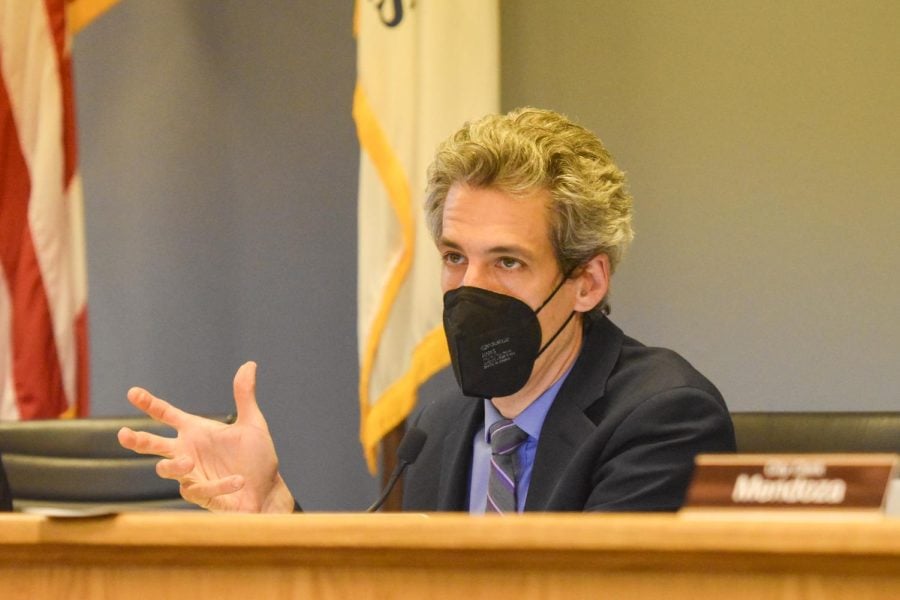Mayor Biss talks Evanston reparations, public safety in State of the City address
Jacob Wendler/The Daily Northwestern
Mayor Daniel Biss at May 24’s City Council meeting. Biss gave the annual State of the City address Friday at Palmhouse, addressing city councilmembers and residents alike.
May 25, 2022
Content warning: This article contains mentions of sexual assault.
Mayor Daniel Biss reflected on Evanston’s challenges and accomplishments during the past year at his first address at the annual State of the City Luncheon Friday.
“It has been an incredible education, a remarkable journey,” he said. “There have been times of real joy, (and) there have been times of real pain in our community.”
Biss took to the podium at Palmhouse amid a tumultuous month for the city. In recent weeks, city officials and residents have discussed fluctuating COVID-19 caseloads, high political turnover and mixed reactions to City Council’s intent to appoint John Fournier as city manager.
As guests filed into the venue on Howard Street Friday morning, about 20 residents protested the city manager selection process outside with signs like “I’m Pissed @ Biss” and “Outraged and Betrayed Again.”
“(Ann Arbor, Michigan) has the exact same problems we have, and (Fournier) has been there for years, and I don’t see that he solved any,” Community Alliance for Better Government member and former 7th ward aldermanic candidate Mary Rosinski said at the protest. “They just came out of a scandal, they just came out of budget problems … it’s time we finally start with a clean slate here.”
The annual in-person event — canceled last year due to COVID-19 — was hosted by the Evanston Chamber of Commerce and sponsored by Rotary International, NorthShore University HealthSystem and Evanston RoundTable. Tickets for the event were $75.
Biss did not address either the protesters outside or the city manager search itself in his nearly 50-minute speech. Early on, he praised the city’s Restorative Housing Program, the first reparations initiative of its kind nationally.
The program recently allocated $25,000 each to 16 residents, which they can spend on home improvement assistance, mortgage assistance or a home purchase. Black residents who lived in Evanston or had parents who lived in the city from 1919 to 1969 qualify.
While Biss acknowledged the program as “a small step,” addressing some critiques of the program’s scope, he said it sets an important precedent.
“It’s a game changer in terms of…what kind of bar we’ve set for other communities that want to truly grapple with their past,” he said.
Biss also highlighted another soon-to-be launched city initiative: a guaranteed income program.
Criticizing the ideology that “you can’t trust poor people with money,” Biss said the city is on the precipice of launching a program with funding from Northwestern’s Good Neighbor Racial Equity Fund.
Biss said the program’s guiding theory is that a community experiencing economic hardship should receive more resources.
“That theory, unfortunately, after a 40-year assault has started to feel radical,” he said.
In his speech, Biss also spoke about an increase in violent crime across the country.
Biss said people have become concerned about their own safety and their community’s climate — leading to resident sentiments that present false dichotomies surrounding public safety.
“The thing that worries me the most is that some of the communication that I get seems to suggest we’ve got to choose,” he said. “We’ve got to choose between safety and racial justice.”
Biss referenced the Reimagining Public Safety Committee, established in May 2021. Though the committee was originally tasked with offering recommendations for the 2022 city budget regarding the Evanston Police Department, it ultimately did not meet that expectation.
Biss said one critical public safety success is the city’s commitment to the creation of a Living Room Program, a walk-in mental health crisis center.
The mayor ended his speech by addressing the “unspeakable acts of abuse” at the city’s lakefront, referring to the allegations of a culture of sexual misconduct within Evanston’s lakefront staff.
Biss said he is proud to say he felt the city treated the crisis with the seriousness it deserved, bringing in an independent third-party investigation.
He also acknowledged the tremendous amount of turnover in the city — and the high number of interim positions filled by staff.
“I don’t want that frustration and anger to lead into feeling like there’s something wrong with all that,” he said. “That turnover means that there is change coming to the city.”
Email: [email protected]
Twitter: @JorjaSiemons
Related Stories:
— Evanston residents protest city manager selection process during State of the City event
— Evanston’s elected officials made big promises on public safety. Here are their primary efforts.












